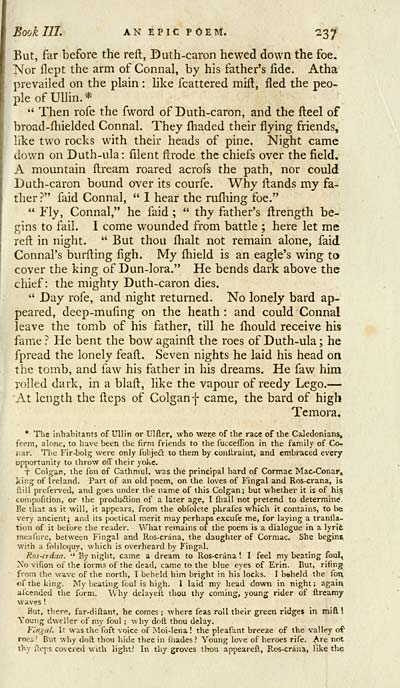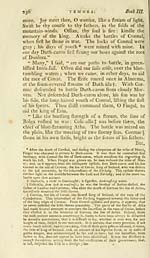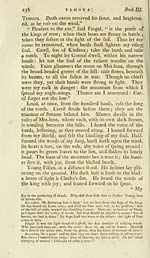Download files
Complete book:
Individual page:
Thumbnail gallery: Grid view | List view

Book III. AN EPIC POEM. '237
But, far before the reft, Duth-caron hewed down the foe.
Nor llept the arm of Connal, by his father's fide. Atha
prevailed on the plain : hke fcattered mift, fled the peo-
ple of UUin.*
" Then rofe the fword of Duth-caron, and the fteel of
broad -fliielded Connal. They fhaded their flying friends,
like two rocks with their heads of pine. Night came
down on Duth-ula : filent ftrode the chiefs over the field.
A mountain ftream roared acrofs the path, nor could
Duth-caron bound over its courfe. Why ftands my fa-
ther ?" faid Connal, " I hear the rufliing foe."
" Fly, Connal," he faid ; " thy father's fl;rength be-
gins to fail. I come wounded from battle ; here let me
reft in night. " But thou flialt not remain alone, faid
Connal's burfting figh. My fliield is an eagle's wing to
cover the king of Dun-lora." He bends dark above the
chief: the mighty Duth-caron dies.
" Day rofe, and night returned. No lonely bard ap-
peared, deep-muling on the heath : and could Connal
leave the tomb of his father, till he fhould receive his
fame ? He bent the bow againft the roes of Duth-ula ; he
fpread the lonely feaft. Seven nights he laid his head on
The tomb, and faw his father in his dreams. He faw him
joUed dark, in a blaft, like the vapour of reedy Lego. —
At length the fteps of Colganf came, the bard of high
Temora.
• The inhabitants of Ullin or Ulfter, who wei^e of the race of the Caledonians,
feem, alone, to have been the firm friends to the fucceflion in the family of Cor
liar. The Fir-bolg were only fubjed to them by conllraint, and embraced every
opportunity to throw oft" their yoke.
t Colgan, the Ton of Cathmul, was the principal bard of Cormac Mac-Conar,
king of Ireland. Part of an old poem, on the loves of Fingal and Ros-crana, is
Hill prelerved, and goes under the name of this Colgan; but whether it is of his
conipofition, or the produdion of a later age, I (hall not pretend to determine.
Be that as it will, it appears, from the obfolete phrafes which it contains, to be
very ancient; and its jwetical merit may perhaps excufe me, for laying a tranlla-
tion of it before the reader. What remains of the poem is a dialogue in a lyrifc
meufure, between Fingal and Ros-crana, the daughter of Cormac. She begins,
with a foliloquy, \\hich is overheard by Fingal.
Ros-adna. " By night, came a dream to Ros-crana! I feel my beating foul^
Xo vifion of the forms of the dead, came to the blue eyes of Erin. But, riling
from the wave of the north, I beheld him bright in his locks. I beheld the ibi^
of the king. My beating Ibul is high. I laid my head down in night ; again
afcended the form. Why delayell thou thy coming, young rider of ilrcamy
waves !
But, there, far-diflant, he comes ; where feas roll their green ridges in mift !
Young dweller of my foul ; why doft thou delay.
Fingal. It was the foft voice of Moi-lena ! the pleafant breeze of the valley of
roes ' Btit why dofl thou hide thee in fliades ? Young love of heroes rife. Are not
thy ftoj^s covered with light? In thy groves thou appeareft, Ros-crana, like the
But, far before the reft, Duth-caron hewed down the foe.
Nor llept the arm of Connal, by his father's fide. Atha
prevailed on the plain : hke fcattered mift, fled the peo-
ple of UUin.*
" Then rofe the fword of Duth-caron, and the fteel of
broad -fliielded Connal. They fhaded their flying friends,
like two rocks with their heads of pine. Night came
down on Duth-ula : filent ftrode the chiefs over the field.
A mountain ftream roared acrofs the path, nor could
Duth-caron bound over its courfe. Why ftands my fa-
ther ?" faid Connal, " I hear the rufliing foe."
" Fly, Connal," he faid ; " thy father's fl;rength be-
gins to fail. I come wounded from battle ; here let me
reft in night. " But thou flialt not remain alone, faid
Connal's burfting figh. My fliield is an eagle's wing to
cover the king of Dun-lora." He bends dark above the
chief: the mighty Duth-caron dies.
" Day rofe, and night returned. No lonely bard ap-
peared, deep-muling on the heath : and could Connal
leave the tomb of his father, till he fhould receive his
fame ? He bent the bow againft the roes of Duth-ula ; he
fpread the lonely feaft. Seven nights he laid his head on
The tomb, and faw his father in his dreams. He faw him
joUed dark, in a blaft, like the vapour of reedy Lego. —
At length the fteps of Colganf came, the bard of high
Temora.
• The inhabitants of Ullin or Ulfter, who wei^e of the race of the Caledonians,
feem, alone, to have been the firm friends to the fucceflion in the family of Cor
liar. The Fir-bolg were only fubjed to them by conllraint, and embraced every
opportunity to throw oft" their yoke.
t Colgan, the Ton of Cathmul, was the principal bard of Cormac Mac-Conar,
king of Ireland. Part of an old poem, on the loves of Fingal and Ros-crana, is
Hill prelerved, and goes under the name of this Colgan; but whether it is of his
conipofition, or the produdion of a later age, I (hall not pretend to determine.
Be that as it will, it appears, from the obfolete phrafes which it contains, to be
very ancient; and its jwetical merit may perhaps excufe me, for laying a tranlla-
tion of it before the reader. What remains of the poem is a dialogue in a lyrifc
meufure, between Fingal and Ros-crana, the daughter of Cormac. She begins,
with a foliloquy, \\hich is overheard by Fingal.
Ros-adna. " By night, came a dream to Ros-crana! I feel my beating foul^
Xo vifion of the forms of the dead, came to the blue eyes of Erin. But, riling
from the wave of the north, I beheld him bright in his locks. I beheld the ibi^
of the king. My beating Ibul is high. I laid my head down in night ; again
afcended the form. Why delayell thou thy coming, young rider of ilrcamy
waves !
But, there, far-diflant, he comes ; where feas roll their green ridges in mift !
Young dweller of my foul ; why doft thou delay.
Fingal. It was the foft voice of Moi-lena ! the pleafant breeze of the valley of
roes ' Btit why dofl thou hide thee in fliades ? Young love of heroes rife. Are not
thy ftoj^s covered with light? In thy groves thou appeareft, Ros-crana, like the
Set display mode to: Large image | Transcription
Images and transcriptions on this page, including medium image downloads, may be used under the Creative Commons Attribution 4.0 International Licence unless otherwise stated. ![]()
| Early Gaelic Book Collections > Ossian Collection > Poems of Ossian, the son of Fingal > (251) |
|---|
| Permanent URL | https://digital.nls.uk/77585537 |
|---|
| Description | Selected books from the Ossian Collection of 327 volumes, originally assembled by J. Norman Methven of Perth. Different editions and translations of James MacPherson's epic poem 'Ossian', some with a map of the 'Kingdom of Connor'. Also secondary material relating to Ossianic poetry and the Ossian controversy. |
|---|
| Description | Selected items from five 'Special and Named Printed Collections'. Includes books in Gaelic and other Celtic languages, works about the Gaels, their languages, literature, culture and history. |
|---|

